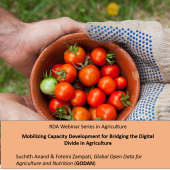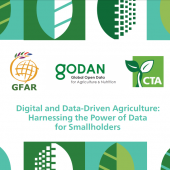Group photo (courtesy of BLE)
There are many inter-linked issues in the whole data value chain that affect the ability of farmers, especially the poorest and most vulnerable, to access, use and harness the benefit of data and data-driven technologies.
There are policy issues (decisions on making data open and prioritizing types of data to open up to investment); technical issues (availability and accessibility of the necessary data for the development of added-value services and tools that process data and make it usable for different purposes and stakeholders); ethical and legal issues (farmers having access to data, and farmers sharing their data with others); as well as issues related to the capacity of stakeholders, particularly resource poor-farmers, to find and use agricultural data for their own benefit.
Of all the issues, the ethical and legal aspects related to accessing and using data by farmers and sharing farmers’ data have been the least explored. Also in the area of policy, the focus is normally on public institutions’ policies on the sharing of their own data, while policy issues related to ethics and equitability of open data access and use, as they apply to resource poor farmers have rarely been put at the centre of the stage. For this reason, the Global Forum on Agricultural Research and Innovation (GFAR), the Global Open Data for Agriculture and Nutrition initiative (GODAN) and the Technical Center for Agricultural and Rural Cooperation (CTA) started a consultation process. They first convening an online consultation (4-8 June 2018, summary here) and then a face-to-face international expert consultation on ethical, legal and policy aspects of data sharing affecting farmers (10-11 July 2018), bringing together experts from a range of different stakeholder groups and perspectives.
The expert meeting was hosted on 10 and 11 July in Bonn by the German Federal Office for Agriculture and Food (BLE), and supported by the Kuratorium für Technik und Bauwesen in der Landwirtschaft (KTBL). The objective of the meeting was to have an initial vision and proposed next steps for collective action on enabling farmers to harness the power of data-driven agriculture.
 Participants were invited to discuss and then write down their vision for enabling farmers to harness the power of data-driven agriculture and in turn benefit all society, focusing on ethical, legal and policy aspects. Part of the discussion was also around framing the issues and the scope of potential collective action: What types of data? Which actors? Where is the focus? Then participants were asked to suggest next steps to start the collective action and recommend initial activities for such action.
Participants were invited to discuss and then write down their vision for enabling farmers to harness the power of data-driven agriculture and in turn benefit all society, focusing on ethical, legal and policy aspects. Part of the discussion was also around framing the issues and the scope of potential collective action: What types of data? Which actors? Where is the focus? Then participants were asked to suggest next steps to start the collective action and recommend initial activities for such action.
Discussions were stimulated by a few presentations (available soon):
- Simone van den Burg (Wageningen University) on “Framing the issues”.
- Ajit Maru “An economics of information perspective”.
- Arianna Giuliodori (WFO) on “The farmers’ perspective”.
- Francois van Schalkwyk on “Open data and economic rights”.
- Ivo Hostens (CEMA) on “Agriculture 4.0: The way forward for the Ag. Machinery industry in Europe”.
Discussions and writing were conducted in groups and it was decided to consolidate the documents after the meeting, collaboratively. The final meeting document will be available by mid-September.
Even though we don’t have consolidated conclusions yet, there seemed to be agreement on some key aspects.
In terms of vision, even though with different emphasis, all participants seemed to agree on the fact that the desired future scenario is that farmers will benefit from data shared by others and will in turn share their farm data in a fair and transparent data ecosystem, thus contributing to and sharing the benefits of a more transparent and sustainable agri-food system.
In terms of shorter-term outcomes, many of the contributions clustered around similar themes:
-
 More awareness of farmers and of all actors in the agri-food system about data flows, data rights, contractual best practices and good business models.
More awareness of farmers and of all actors in the agri-food system about data flows, data rights, contractual best practices and good business models. - Farmers’ aggregations encouraged taking responsibilities over farmers’ data sharing and data rights.
- More social responsibility and accountability through voluntary guidelines.
- More capacities developed at all levels on ethical, legal and socio-economic aspects of agri-food data flows.
And when it came to proposing actual activities and outputs for the collective action, here are just a few examples of the ideas that were put forward:
For the process:
- Final vision and action plan made into an investable proposal.
- Broadening of the network, inclusion of other actors.
- Joint resource mobilization.
For the actual action:
- Inventory of current policies, laws, contractual practices and business models in different countries.
- Collection of stories, research and think pieces on ethics, applicable law, costs…
- A map of the data chain to identify the different data, the different uses and who is involved.
- A “growers’ on-line toolkit” with information and tools, checklists, making existing materials available on line (including legal and ethical materials).
- Voluntary guidelines on farm data sharing.
- Experiments with legal mechanisms (contract templates / appendices; “legal clinics”, legal actions) as well as certification schemes or social certification mechanisms.
- Local experiments on governance and business models for “data cooperatives” and for technology platforms (big data, blockchain).
- Feasibility study on an international agreement / Treaty.
We now look forward to the final version of the vision document and the action plan so that we can proceed with the formalization of the action, the creation of an initial group of leaders and some joint resource mobilization. We are grateful to the German Federal Office for Nutrition and Food (BLE) for hosting us and we want to thank all the participants who did a great job in a demanding meeting, in particular the group coordinators (Simone van der Burg, Francois Van Schalkwyk, Leanne Wiseman, Shawn Sullivan), the presenters (Simone and Francois again, Ajit Maru, Arianna Giuliodori, Edward Katende, Ivo Hostens) and our facilitator, Tobias Webb.
Valeria Pesce, GFAR
For list of Participants visit the GFAR website.






